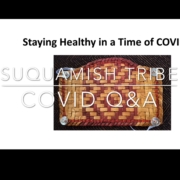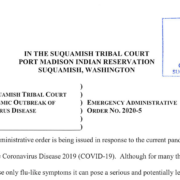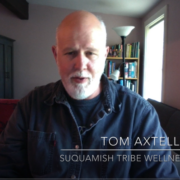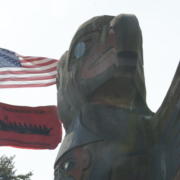Online Forum: Covid Q&A
Suquamish Tribal Court slated to resume operations June 8
The Suquamish Tribal Court announced it will tentatively resume regular operations on June 8.
In an update to its Emergency Administrative Order filed May 28, the Court said the reopening could be delayed “depending on the status of the COVID-19 public health emergency.”
In the meantime, the Court will continue to be available “to hear all matters of an urgent nature, including requests for all types of protection orders and emergency child welfare orders.”
Questions should be sent to the court clerks at suquamishcourt@suquamish.nsn.us or by calling (360) 394-8697.
You can read the full order here.
How-to: Reduce Anxiety with the Emotional Freedom Technique
In this how-to video, Tom Axtelle, a Licensed Mental Health Counselor with the Suquamish Tribe Wellness Center, provides a practical method to help manage and reduce anxiety.
Called the Emotional Freedom Technique, this series of tapping motions may seem a little strange at first, but has been shown to help people suffering from post-traumatic stress, anxiety, and depression.
Give it a try!
Suquamish Tribal Council Extends Limited Government Operations
For the health and safety of the Tribal community, Suquamish Tribal Council has extended temporary remote government operations until June 7, 2020.
A limited number of staff members are available to respond to urgent issues. They can be reached via telephone at the numbers below, or via email. Please call (360) 598-4334 for general questions.
You may also contact our response team by sending emails to: covid_questions@suquamish.nsn.us and check our Facebook page here. You can also check the COVID-19 Updates page on the official Suquamish Tribe website here.
The Suquamish Police Department
The Police Department lobby will be available to drop off child support payments, applications, housing payments, and other government-related paperwork. Staff and officers can also forward messages to other Tribal departments as needed.
Lobby Hours:
Mon-Fri – 8am to 4:30pm
Contact
Front Desk: (360) 598-4334
Emergency: call or text 911
Telework and On-call Services
Communications: (360) 394-7184/7102
Community Development: (360) 394-8415
Emergency Work Orders: (360) 900-7050
Emergency Utilities: (360) 710-3223
Elders Meals: (360) 394-8413
Health Benefits: (360) 394-8466
Human Resources: (360) 394-8409
Human Services: (360) 394-8465
IT Help Desk: (360) 394-8485
Finance: (360) 394-8430
Fisheries: (360) 394-8438
Tribal Child Welfare: (360) 394-8480
Tribal Court: (360) 394-8697
Wellness Center
Therapists are meeting with existing clients through phone/video sessions. A contact list of providers is available here.
Contact
Front desk: (360) 394-8558
Wellness Fax – (360) 598-1724
Emergency: call or text 911
Crises Hotline: (888) 910-0416
Chat: www.imhurting.org
Wellness offering weekly community support group
Did you know that May is Mental Health Awareness Month?
Many people struggle with depression, anxiety, pain, addiction, grief and loss, and other challenges and disorders that significantly impact our lives. Especially during these times of unprecedented events and social distancing, it is important to know that you are not alone.
If you, or someone you know, are struggling, the Suquamish Wellness Center is here for support.
Currently, Wellness is hosting a weekly online community support group on Zoom for anyone who would like to participate. You do not need to be a client of the Wellness Center. This is a drop-in group; regular attendance is not required.
Community Support Group
Tuesdays 12:00 noon
https://zoom.us/j/290555845
Meeting ID: 290 555 845
Password: HELLO
The Wellness Center also offers many services, including:
Psychiatric services
Naturopathic services
Medication Assisted Treatment (MAT)
Substance Use Disorder (SUD)
Process addictions (such as gambling, sex, or internet addiction)
Mental Health (MH)
Domestic Violence (DV) Victim Advocacy
Please call the Wellness front desk with questions, or to request services: (360) 394-8558
Current clients can contact their treatment providers directly, using the staff directory posted here.
For emergencies, contact:
Emergency: 9-1-1
Crisis Hotline: 1-888-910-0416
Online chat: www.imhurting.org
Suicide Prevention Lifeline: 1-800-273-8255
8 Tips to Break Out of the COVID Funk
Boost your balance, amplify awareness, and increase well-being with these simple tricks you can try now
During all the changes, closures, and social isolation due to the COVID-19 outbreak, it is important to maintain balance and a healthy lifestyle. Stop a moment and take inventory of all the areas of your life. You may find a need to plan and act with increased intention and awareness during this time, to promote and maintain physical, mental, social, emotional, and spiritual health and well-being.
Here are 8 tips:
- Take one step at a time
It is easy to become overwhelmed, anxious, or scared when faced with extreme situations and obstacles. Focus on what you can control. Focus on what will produce feelings of joy, pride, and comfort. Stay informed, but limit your exposure to social media and the news. Focus on today, and find ways to feel productive.
- Be kind
Be supportive, forgiving, and kind to others, including when you are online. Offer thanks to important people in your life. Also – be gentle to yourself. Acknowledge your strengths. Smile.
- Be flexible
In the face of adversity and challenge, adapt. Change your plans and expectations. Look for and discover new ways of doing and being. Explore and be creative. Try something new. Start that project you’ve been thinking about for months.
- Plan ahead
If you are feeling overwhelmed because each day feels chaotic, develop a schedule. Budget your time. Set limits, expectations and boundaries for yourself and for your family. This could include things like reducing screen time, increasing sleep or exercise, or scheduling quality time to do an activity with your family or friends (in person… or online!)
- Stay positive
Don’t allow yourself to hyper-focus on the negative; think and speak in a positive way. Model this for others who are struggling. Don’t criticize others, and don’t criticize yourself.
- Take care of yourself
Don’t neglect the basics: Get plenty of sleep. Exercise regularly. Eat healthy. Drink water. Reduce or eliminate alcohol and drugs (now is a great time to quit smoking!). Pray, meditate, or journal daily. You will be better prepared and equipped to help others if you are taking care of yourself.
- Take care of others
Reach out to someone you haven’t heard from in a few days. Send an email, a text, or a Snap. Give a family member a call. Be aware of other people’s needs. Don’t hoard! – take what you need. Give.
- Relax and enjoy today
Look for the bright part of each day and give thanks. Don’t dwell on thoughts such as “I wish this was over!” Focus on what you have today, and what you can do with your time and energy. Find ways to calm down if you find your stress levels too high. Share these ideas with others. It may sound wild to say, but: enjoy this journey.
Jonathan Glover, LICSW, is the mental health supervisor at the Suquamish Wellness Center. If you have questions, or to request services, please call the main phone number: (360) 394-8601.
Suquamish Court Extends Modified Operations
The Suquamish Tribal Court extended its modified operations until at least May 15 in response to the COVID-19 pandemic.
“The Court is striving to address the needs of the community, while taking every precaution to keep community members healthy and prevent the spread of the coronavirus,” reads an updated Emergency Administrative Order, signed by Chief Judge Cindy K. Smith on April 30.
As part of the order, all criminal cases and jury trials are delayed until the court resumes normal operations, tentatively slated for May 18. This date, however, may be extended depending on the status of the public health emergency.
Meanwhile, all civil and child welfare cases have been rescheduled to June 2020.
The Court continues to be available “to hear all matters of an urgent nature, including requests for all types of protection orders and emergency child welfare orders.”
Any hearings will continue to be conducted via video teleconference.
Questions should be sent to the court clerks at suquamishcourt@suquamish.nsn.us or by calling (360) 394-8697.
The full order can viewed here.
Suquamish Tribe extends modified operations
The Suquamish Tribal Council has extended the order on Temporary Remote Tribal Government Operations until May 18, 2020.
This action was taken to minimize the spread of the COVID-19 virus. The full resolution can viewed here.
For information about how to contact Tribal government staff or obtain services during this time, please check here.
Update from Chairman Forsman
An update from Suquamish Tribe Chairman Leonard Forsman on Tribal operations in response to the Covid-19 pandemic.










